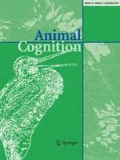Abstract
As researchers explore animals’ capacity for metacognition and uncertainty monitoring, some paradigms allow the criticism that animal participants—who are always extensively trained in one stimulus domain within which they learn to avoid difficult trials—use task-specific strategies to avoid aversive stimuli instead of responding to a generalized state of uncertainty like that humans might use. We addressed this criticism with an uncertainty-monitoring task environment in which four different task domains were interleaved randomly trial by trial. Four of five macaques (Macaca mulatta) were able to make adaptive uncertainty responses while multi-tasking, suggesting the generality of the psychological signal that occasions these responses. The findings suggest that monkeys may have an uncertainty-monitoring capacity that is like that of humans in transcending task-specific cues and extending simultaneously to multiple domains.



Similar content being viewed by others
References
Atkinson RC, Juola JF (1974) Search and decision processes in recognition memory. In: Krantz DH, Atkinson RC, Luce RD, Suppes P (eds) Learning, memory and thinking. W.H. Freeman, San Francisco, pp 242–293
Beran MJ, Smith JD, Redford JS, Washburn DA (2006) Rhesus macaques (Macaca mulatta) monitor uncertainty during numerosity judgments. J Exp Psychol Anim Behav Proc 32:111–119
Boring EG (1920) The control of attitude in psychophysical experiments. Psychol Rev 27:440–452
Call J, Carpenter M (2001) Do apes and children know what they have seen? Anim Cogn 4:207–220
Carruthers P (2008) Meta-cognition in animals: a skeptical Look. Mind Lang 23:58–89
Fernberger SW (1914) The effect of the attitude of the subject upon the measure of sensitivity. Am J Psychol 25:538–543
Flavell JH (1979) Metacognition and cognitive monitoring: A new area of cognitive-developmental inquiry. Am Psychol 34:906–911
Foote A, Crystal J (2007) Metacognition in the rat. Curr Biol 17:551–555
Gallup GG (1982) Self-awareness and the emergence of mind in primates. Am J Primatol 2:237–248
Ghetti S, Lyons K, Lazzarin F (2008) The development of metamemory monitoring during retrieval: the case of memory strength and memory absence. J Exp Child Psychol 99:157–181
Hampton RR (2001) Rhesus monkeys know when they remember. Proc Natl Acad Sci 98:5359–5362
Koriat A (1993) How do we know that we know? The accessibility model of the feeling of knowing. Psychol Rev 100:609–639
Koriat A (2007) Metacognition and consciousness. In: Zelazo PD, Moscovitch M, Thompson E (eds) The Cambridge handbook of consciousness. Cambridge University Press, Cambridge, pp 289–325
Koriat A, Ma’ayan H, Nussinson R (2006) The intricate relationships between monitoring and control in metacognition: lessons for the cause-and-effect relation between subjective experience and behavior. J Exp Psychol Gen 135:36–69
Kornell N, Son L, Terrace H (2007) Transfer of metacognitive skills and hint seeking in monkeys. Psychol Sci 18:64–71
Kuhn D (2000) Metacognitive development. Curr Dir Psychol Sci 9:178–181
Lockl K, Schneider W (2002) Developmental trends in children’s feeling-of-knowing judgements. Int J Behav Dev 26:327–333
Metcalfe J (2000) Metamemory: theory and data. In: Tulving E, Craik FIM (eds) The Oxford handbook of memory. Oxford University Press, New York, pp 197–211
Nelson TO (ed) (1992) Metacognition: core readings. Allyn and Bacon, Toronto
Nelson TO (1996) Consciousness and metacognition. Am Psychol 51:102–116
Proust J (2003) Does metacognition necessarily involve metarepresentation? Behav Brain Sci 26:352
Proust J (2007) Metacognition and metarepresentation: is a self-directed theory of mind a precondition for metacognition? Synthese 2:271–295
Roebers CM, von der Linden N, Schneider W, Howie P (2007) Children’s metamemorial judgments in an event recall task. J Exp Child Psychol 97:117–137
Rumbaugh DM, Richardson WK, Washburn DA, Savage-Rumbaugh ES, Hopkins WD (1989) Rhesus monkeys (Macaca mulatta), video tasks, and implications for stimulus-response spatial contiguity. J Comp Psychol 103:32–38
Schwartz BL (1994) Sources of information in metamemory: judgments of learning and feelings of knowing. Psychon Bull Rev 1:357–375
Shields WE, Smith JD, Guttmannova K, Washburn DA (2005) Confidence judgments by humans and rhesus monkeys. J Gen Psychol 132:165–186
Shiffrin RM, Schneider W (1977) Controlled and automatic human information processing: II Perceptual learning, automatic attending, and a general theory. Psychol Rev 84:127–190
Smith JD, Shields WE, Allendoerfer KR, Washburn WA (1998) Memory monitoring by animals and humans. J Exp Psychol Gen 127:227–250
Smith JD, Shields WE, Washburn DA (2003) The comparative psychology of uncertainty monitoring and metacognition. Behav Brain Sci 26:317–373
Smith JD, Beran MJ, Redford JS, Washburn DA (2006) Dissociating uncertainty states and reinforcement signals in the comparative study of metacognition. J Exp Psychol Gen 135:282–297
Smith JD, Beran MJ, Coutinho MVC, Couchman JC (2008) The comparative study of metacognition: Sharper paradigms, safer inferences. Psychon Bull Rev 154:679–691
Smith JD, Beran MJ, Couchman JJ, Coutinho MVC, Boomer J (2009) Animal metacognition: problems and prospects. Comp Cogn Behav Rev 4:33–46
Suda-King C (2008) Do orangutans (Pongo pygmaeus) know when they do not remember? Anim Cogn 11:21–42
Sutton JE, Shettleworth SJ (2008) Memory without awareness: Pigeons do not show metamemory in delayed matching-to-sample. J Exp Psychol Anim Behav Proc 34:266–282
Washburn DA, Rumbaugh DM (1992) Testing primates with joystick-based automated apparatus: lessons from the Language Research Center’s Computerized Test System. Behav Res Methods Instrum Comput 24:157–164
Washburn DA, Smith JD, Shields WE (2006) Rhesus monkeys (Macaca mulatta) immediately generalize the uncertain response. J Exp Psychol Anim Behav Proc 32:85–89
Watson CS, Kellogg SC, Kawanishi DT, Lucas PA (1973) The uncertain response in detection-oriented psychophysics. J Exp Psychol 99:180–185
Acknowledgments
This research was supported by National Institutes of Health Grant HD-38051 and by Grant BCS-0634662 from the National Science Foundation. All applicable institutional rules and regulations regarding animal care and use were followed in the care and testing of the monkeys, and the experiment complied with all laws of the United States of America. The authors thank Theodore Evans for his assistance with data collection.
Author information
Authors and Affiliations
Corresponding author
Rights and permissions
About this article
Cite this article
Smith, J.D., Redford, J.S., Beran, M.J. et al. Rhesus monkeys (Macaca mulatta) adaptively monitor uncertainty while multi-tasking. Anim Cogn 13, 93–101 (2010). https://doi.org/10.1007/s10071-009-0249-5
Received:
Revised:
Accepted:
Published:
Issue Date:
DOI: https://doi.org/10.1007/s10071-009-0249-5




